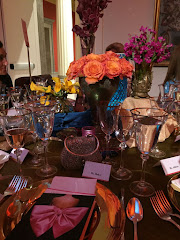On Downton Abbey last week while at the dinner table, Edith's new beau, Michael Gregson, Editor of The Sketch, said: "Time to turn." Did anyone catch that? Did y'all get what he meant? Did y'all realize dinner conversation has but two sides: left and right.
The old tradition is, in the middle of the meal one must "turn" if one has been chattering away with only one guest on one side. Simply very politely say to the person with whom you are in conversation you would love to continue your conversation later, but that you must not ignore the other person on your other side, and nicely excuse yourself.
Nothing worse than to be at a dinner party and you are completely ignored, and besides, leaders always make others feel special!
So, enjoy a nice dinner, and enjoy your "turn."
Tuesday, January 28, 2014
Friday, January 10, 2014
The Top Lady Behind the Green Baize Door at Downton
In Edwardian England, the Green Baize Door, a thick woollen cloth used on tables and doors, of the grand Manor Houses of the day, separated the paid staff from the family members of the house.
From the 1860's until WWI, around 1.5 million paid career servants served as the largest single occupation in England. To be a member of The Servant Class was considered by the mostly poor, rural society of the day, to be quite dignified as a profession, and a good opportunity for a young person with no opportunity, or no family, to be gainfully employed.
As a paid servant, the room and board was free, one received a small salary and retirement, (although the average annual salary was about half the cost of one fancy meal of the landed gentry class), one had the chance to meet, and possibly marry a peer, and one had the opportunity to learn the etiquette and manners of the day, and many marketable skills. If successful within this life of servitude, with time, one could move up within the hierarchy of paid servants. The positions towards the top of the hierarchy for women included Housekeeper, Nanny, Governess, and the number one position was the Lady's Maid because in this position, one was the closest person in proximity to the Lady of the Manor House.
Behind the Green Baize Door last Sunday night we discovered Lady Grantham's long time Lady's Maid, O'Brien, suddenly and stealthily departed Downton to work for another Lady in Scotland. O'Brien met her new employer while she was traveling with her present employer, Cora, Lady Grantham of Downton Abbey. O'Brien's reason for leaving Downton had to do with hair.
The distinguishing quality which separated a Lady's Maid from a House Maid in Edwardian England, and up until the beginning of WWII, was the ability of the Lady's Maid to style hair. Her talent as a hairdresser, which required a course of study and training, assured her employer she could keep up with the latest trends and ever changing hair fashions of the day, and this special skill more than justified her keep. The Lady's Maid also had to be quite proficient as a seamstress, able to sew, mend, alter and refurbish the Lady's wardrobe which saved on the dressmaker's bill. The Lady's Maid as well accompanied the Lady on all her travels, and was responsible for taking care of the Lady's jewels.
So, if one chose to live within this old world order, the Lady's Maid position was the job to have had.
From the 1860's until WWI, around 1.5 million paid career servants served as the largest single occupation in England. To be a member of The Servant Class was considered by the mostly poor, rural society of the day, to be quite dignified as a profession, and a good opportunity for a young person with no opportunity, or no family, to be gainfully employed.
As a paid servant, the room and board was free, one received a small salary and retirement, (although the average annual salary was about half the cost of one fancy meal of the landed gentry class), one had the chance to meet, and possibly marry a peer, and one had the opportunity to learn the etiquette and manners of the day, and many marketable skills. If successful within this life of servitude, with time, one could move up within the hierarchy of paid servants. The positions towards the top of the hierarchy for women included Housekeeper, Nanny, Governess, and the number one position was the Lady's Maid because in this position, one was the closest person in proximity to the Lady of the Manor House.
Behind the Green Baize Door last Sunday night we discovered Lady Grantham's long time Lady's Maid, O'Brien, suddenly and stealthily departed Downton to work for another Lady in Scotland. O'Brien met her new employer while she was traveling with her present employer, Cora, Lady Grantham of Downton Abbey. O'Brien's reason for leaving Downton had to do with hair.
The distinguishing quality which separated a Lady's Maid from a House Maid in Edwardian England, and up until the beginning of WWII, was the ability of the Lady's Maid to style hair. Her talent as a hairdresser, which required a course of study and training, assured her employer she could keep up with the latest trends and ever changing hair fashions of the day, and this special skill more than justified her keep. The Lady's Maid also had to be quite proficient as a seamstress, able to sew, mend, alter and refurbish the Lady's wardrobe which saved on the dressmaker's bill. The Lady's Maid as well accompanied the Lady on all her travels, and was responsible for taking care of the Lady's jewels.
So, if one chose to live within this old world order, the Lady's Maid position was the job to have had.
Subscribe to:
Comments (Atom)









